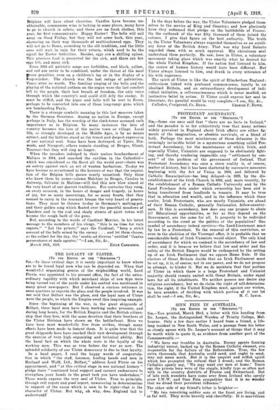PROTESTANT ASCENDANCY.
[TO THE EDITOR OF THE "SPECTATOR."]
Sra,—Some one once said that "there are no facts in Ireland," and the paradox is so far subjectively true that many notions widely prevalent in England about Irish affairs are either fig- ments of the imagination, or obsolete survivals, or a blend of both. Perhaps the most mischievous of these delusions is the seemingly invincible belief in a mysterious something called Pro- testant Ascendancy, for the maintenance of which Irish, and especially Ulster, Unionists are supposed to be obstinately fight- ing, and thereby rendering impossible any "settlement by con- sent" of the problem of the government of Ireland. That Protestant Ascendancy was once a stern reality is, of course, matter of history, but it has been shattered by successive measures beginning with the Act of Union in 1800, and followed by Catholic Emancipation—too long delayed—in 1829, by the dis- establishment of the Irish Church in 1869, and, more recently, by the establishment of a Roman Catholic University and by the Land Purchase Acts under which ownership has been and is being transferred from landlords to tenants. It may be true that in education and wealth, and, in the influence which these confer, Irish Protestants, who are mostly Unionists, are ahead of their Roman Catholic, generally Nationalist, fellow-country- men. If this is ascendancy, how does any one propose to abate it? Educational opportunities, BO far as they depend on the Government, are the same for all. Is property to be redivided according to the creed or the politics of the population? One symbol of ascendancy indeed survives—the Lord-Lieutenant must by law be a Protestant. To the removal of this restriction, or even to the abolition of the Viceregal office, it is probable that no considerable body of Irish Unionists would object. The only kind of ascendancy for which we contend is the ascendancy of law and order,. and it is because we believe that law and order and the safety of the British Empire would be endangered by the setting up of an Irish Parliament that we oppose Home Rule. If the electors of Great Britain decide that an Irish Parliament must be set up, it is, of course; not in our power, and we do not propose to attempt, to"hinder it. But we do maintain that that portion of Ulster in which there is a large Protestant and Unionist majority should remain united with Great Britain, under equal laws for all its inhabitants. We neither, possess nor desire any religions ascendancy, but we do claim the right of self-determina- tion, the right, if the United Kingdom must, against our wishes, be torn asunder, of deciding with -which portion of it our lot


























 Previous page
Previous page